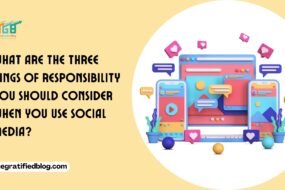
This blog will delve into the diverse social media marketing strategies available to businesses seeking to enhance their online presence, build brand awareness, and drive conversions. We will explore the multitude of approaches that can empower businesses to harness the true potential of social media platforms and maximize their marketing efforts.
In this blog, we will delve into the types of social media marketing strategies available to businesses seeking to enhance their online presence, build brand awareness, and drive conversions. We will explore the multitude of approaches that can empower businesses to harness the true potential of social media platforms and maximize their marketing efforts.
We will also provide tips for how to get started with social media marketing and share some frequently asked questions from business owners.
So, let’s get started.
What Is Social Media Marketing?
Social media marketing strategically uses various platforms to promote and expand a business. In today’s marketing landscape, social media has become a fundamental tool, enabling companies to directly engage with their target audience and forge more profound, personal connections.
Why Is Social Media Marketing Important?
The success of any venture is significantly influenced by the pivotal role played by social media marketing businesses for several compelling reasons:
- Direct Audience Connection: Social media platforms offer direct communication with your target audience. By engaging, you can establish trust, foster credibility, and cultivate meaningful relationships. As a result of this interaction, there is the potential for a boost in sales, conversions, and customer loyalty.
- Global Reach: With social media, geographical barriers dissolve, allowing your business to reach a vast, global audience. Regardless of location, you can expand your customer base, attract new prospects, and extend your brand’s influence to previously untapped markets.
- Brand Awareness Amplification: Social media provides a powerful platform for amplifying brand awareness. By consistently sharing high-quality content, you can effectively raise awareness about your products or services, enhance brand visibility, and develop a positive reputation within your industry.
- Tactical Experimentation: Social media enables businesses to experiment with various marketing tactics. You can test different approaches and gauge their effectiveness, from paid advertising to influencer collaborations. Utilizing this valuable insight enables you to enhance and fine-tune your approach strategies and allocate resources more efficiently, ensuring optimal results for your business.
- Customer Support and Service: Social media is an exceptional customer service and support tool. You can deliver efficient and personalized assistance by promptly addressing customer inquiries, concerns, or issues through social media channels. This enhances customer satisfaction, fosters loyalty, and showcases your commitment to exceptional customer experiences.
While social media marketing offers numerous benefits, it is essential to establish certain fundamental pillars to ensure its success.
So, Let’s delve into these critical pillars that underpin successful social media marketing.
Pillars Of Social Media Marketing
To optimize the impact of social media marketing, four essential pillars serve as the foundation for a successful marketing strategy. These pillars are vital for implementing and optimizing social media strategies, enabling businesses to achieve optimal results from their marketing efforts.
Let’s explore these four key pillars of social media marketing.
Strategy
The first crucial pillar of social media marketing is strategy.
It encompasses defining clear goals, developing a well-thought-out social media content calendar, and carefully selecting the appropriate platforms for your business.
Equally crucial is understanding your target audience, including their preferences and behaviors preferences, needs, and desires. By formulating a comprehensive strategy, businesses can effectively Harmonize their social media initiatives with their broader marketing strategy objectives and better cater to their audience’s expectations.
Planning And Publishing
After formulating a strategy, the next pillar of social media marketing is planning and publishing.
This stage revolves around developing and delivering exceptional content that resonates with your target audience. It entails crafting targeted and engaging blog posts, captivating images, and compelling videos.
By consistently sharing valuable content, businesses can capture their audience’s attention, foster meaningful connections, and establish themselves as authoritative voices within their industry.
Engagement And Listening
The third foundation of social media marketing involves engagement and listening.
To establish meaningful connections with your audience, it is crucial to participate and engage with them in real-time actively. This involves attentively monitoring your social media channels, promptly responding to customer queries, and engaging with comments and reviews.
By actively listening to their audience, Companies can showcase their dedication to customer satisfaction, establish trust, and foster a sense of community around their brand.
Analytics
Analytics constitutes the fourth cornerstone of social media marketing.
Evaluating and analyzing your social media performance is crucial to any successful marketing strategy. By tracking and assessing your analytics, you obtain valuable insights into the performance of your content.
This allows you to pinpoint the types of content that resonate most with your audience. Identify areas for enhancement and base your decisions on data to optimize your social media marketing efforts.
By leveraging analytics, businesses can continually refine their
Refine their strategies to attain improved results in reaching and engaging their intended audience.
Having explored the fundamental pillars of social media marketing, let us now delve into the various types of social media marketing strategies.
Types Of Social Media Marketing
Businesses can use social media marketing to grow their brand and connect with their audience. Among the widely favored forms of social media marketing are include:
Advertising/Sponsorship

This strategy involves investing in paid promotions on well-liked social media platforms such as Facebook or Instagram. By advertising and sponsorship, businesses can extend their reach to a broader audience, enhance brand awareness, and drive valuable website traffic.
However, it is crucial to remember that advertising and sponsorship are not a one-size-fits-all solution. It is essential to consider the platforms where Recognize the platforms where your intended audience is actively engaged. This ensures that your ads are strategically placed where your ideal customers are most likely to see them, maximizing the effectiveness of your social media marketing efforts.
By selecting the right platforms and tailoring your advertisements to resonate with your target audience, you can attain superior outcomes and establish connections with potential customers. More effectively.
Influencer Marketing

Influencer marketing is another impactful type of social media marketing strategy. It entails Partnering with influential figures in your industry or niche to endorse your products or services brand. By partnering with relevant influencers, you can tap into their loyal following, expand your reach to a broader audience, and instill trust in potential customers.
Engaging with influencers can yield significant advantages for brand building/marketing. However, it is crucial to approach influencer selection with care and diligence.
Please do so to avoid an incongruous partnership that can hurt your brand image. Therefore, thorough research and careful consideration are necessary to ensure a fruitful and mutually beneficial collaboration with influencers who can authentically represent your brand and connect with your ideal customers.
When selecting influencers for your marketing campaigns, keep the following tips in mind:
Relevance
Select influencers who share your brand’s values, cater to your industry, and appeal to your target audience. Their expertise and content should align with your brand’s message and effectively engage the desired audience you want to connect with.
Engagement
Look for influencers who have a solid and active engagement with their followers. High engagement rates indicate that their audience is actively interested and responsive to their content, increasing the likelihood of positive results for your brand.
Audience Alignment
Consider collaborating with influencers who share a similar target audience to your own. This alignment ensures that your message reaches individuals who are more likely to be interested in your products or services.
Track Record
Evaluating an influencer’s track record involves analyzing their past collaborations with brands and assessing the performance of those campaigns. Look for metrics like engagement rates, click-through rates, conversions, and overall brand impact. A successful track record indicates that the influencer can deliver meaningful results for your marketing campaign.
Budget
Determining a budget for influencer marketing is crucial as it sets the framework for your campaign’s scope and potential outcomes. Consider the influencer’s reach, engagement, and expertise when negotiating compensation. A fair and appropriate budget ensures a mutually beneficial partnership and helps attract influencers with the right level of influence for your niche.
By carefully selecting influencers based on the above tips, you can maximize the effectiveness of your influencer marketing campaigns and achieve better outcomes for your brand.
Social Media Contests And Giveaways
Social media contests and giveaways are engaging marketing strategies that leverage the interactive nature of social media platforms to attract attention, increase brand visibility, and encourage user participation. These campaigns typically offer participants prizes, rewards, or exclusive experiences In return for particular actions or behaviors, such as sharing, commenting, or tagging friends.
Enterprises can generate enthusiasm and buzz surrounding their brand by hosting contests or giveaways. Such initiatives instill a feeling of urgency and anticipation, compelling followers and users to engage actively with the brand’s social media content. Contests and giveaways, with their interactive nature, foster the creation of user-generated content. Participants frequently share posts, photos, or videos related to the campaign, amplifying brand exposure within their networks.
Furthermore, social media contests and giveaways offer valuable chances for businesses to gather user data, grow their follower base, and bolster customer loyalty.
Reviews

Reviews play a significant role in social media marketing, as they provide valuable insights into a business’s reputation and help build trust with potential customers. Positive reviews from satisfied customers on platforms like Yelp or Facebook can enhance a business’s credibility and demonstrate its popularity among its existing customer base.
However, it’s important to note that acquiring positive customer reviews takes time and effort. Businesses must build solid customer relationships through excellent products, services, and customer experiences. By delivering exceptional value and consistently exceeding customer expectations, companies can increase the likelihood of receiving positive reviews.
On the other hand, negative reviews can harm a brand’s reputation. Businesses must handle negative feedback with care and professionalism. Responding to customer concerns transparently, addressing issues promptly, and seeking resolutions can help mitigate the impact of negative reviews. By demonstrating a commitment to customer satisfaction and showing that customer feedback is valued, businesses can turn negative experiences into positive ones and rebuild trust with dissatisfied customers.
Overall, customer reviews on social media platforms serve as powerful social proof, influencing the purchasing decisions of potential customers.
Content Marketing On Social Media

Content marketing on social media involves creating and sharing valuable, relevant, and compelling content to attract and engage your target audience. It is a strategic marketing approach focusing on delivering content that educates, entertains, or inspires your audience while subtly promoting your brand.
Through content marketing on social media, businesses can establish themselves as industry experts and thought leaders by providing insightful information, practical tips, or entertaining stories. By consistently delivering high-quality content, companies can build trust, credibility, and brand loyalty among their followers.
The key to successful content marketing on social media is understanding your audience and their needs. By conducting thorough research and analysis, you can identify your target audience’s interests, preferences, and pain points. There are various tools available to support your content marketing efforts. Some of them are as follows:
Content Planning And Scheduling
- Hootsuite: Hootsuite is a social media management platform that allows you to schedule and publish content across multiple social media platforms.
- Buffer: Buffer is another social media management tool that enables you to plan, schedule, and analyze your content across various social networks.
Content Creation And Design
- Canva: Canva is a user-friendly graphic design platform Providing a diverse selection of templates and design elements for visually appealing social media graphics.
- Adobe Creative Cloud: A suite of professional design tools, including Photoshop, Illustrator, and InDesign, for creating custom graphics and visual content.
Content Discovery And Curation
- BuzzSumo: BuzzSumo helps identify popular content and trending topics in your industry, allowing you to curate relevant and engaging content for your audience.
- Feedly: Feedly is a content aggregation tool that allows you to discover and curate content from various sources, helping you stay updated and find inspiration for your content.
Well, these are the most important types of social media marketing. By understanding and implementing these concepts in your strategy, you can grow your brand and connect with your audience meaningfully.
FAQs
Q. Which Social Media Marketing Types Should I Focus On Highly?
When it comes to social media marketing, businesses should focus highly on all the types of social media marketing mentioned above. All the abovementioned types are essential to a successful social media marketing strategy.
Q. What Businesses Should Choose Social Media Marketing?
Businesses, from small startups to large corporations, can benefit from social media marketing. Whether you’re looking to reach a wider audience, build trust with potential customers, or improve customer retention, social media marketing can help you achieve these goals.
Final Thoughts
Now that you know about the various types of social media marketing, it’s time to start implementing them in your marketing strategy. And start getting results for your business!
If you have any questions regarding types of social media marketing, then feel free to leave them in the comment section. We will be happy to answer you.
Thanks for reading 🙂
Also read: A Complete Guide To Twitter Marketing, and
Learn How To Conduct A Facebook Audit?








No Comments